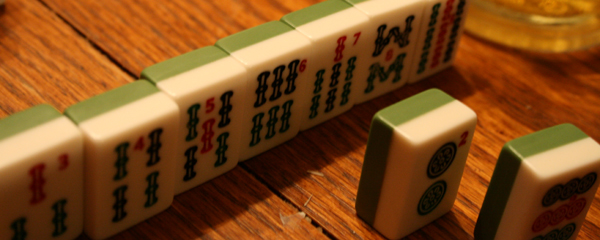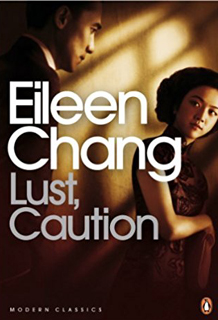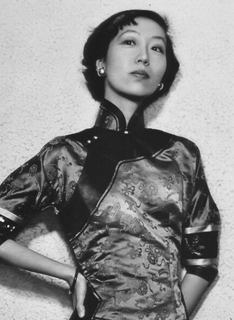
('Tiles'© Ben Ward,2006)
VULGAR OSTENTATION: EXPLICIT DISPLAY AND IMPLICIT SENSATION IN ‘LUST, CAUTION’
BY CHRIS MACHELL
At only 35 pages, Chinese author Eileen Chang‘s 1979 short story ‘Lust, Caution’ is structured as a taut spy thriller. Set during the Japanese occupation of China during World War Two, Chang’s prose is direct and efficient, yet evokes well-springs of emotion, historical trauma, and shared cultural memory. In the story, the young Jiazhi is recruited by a group of Chinese students resisting the Japanese occupation. Her job is to pose as a well-to-do married woman (a taitai) to infiltrate the house of high-ranking Chinese official Yi, who is collaborating with the Japanese occupying force. From there, Jiazhi seduces him into an affair in order to draw him out into the open so that her comrades can assassinate him.
 Though the narrative moves between the present and flashbacks, the plot of ‘Lust, Caution’ is quite straightforward, with the descriptions of Jiazhi’s companions’ conspicuous wealth, and the decor of Shanghai’s bourgeois cafés to take precedence. Moreover, Chang’s evocation of physical space give a directness to her story that helps to create a sense of dramatic and emotional depth that is never made explicit. Indeed, until the finale, the reader never sees Yi and Jiazhi together, and Jiazhi’s descriptions of their affair are limited to the practicalities of the conspiracy. They are rarely about her personal feelings towards Yi:
Though the narrative moves between the present and flashbacks, the plot of ‘Lust, Caution’ is quite straightforward, with the descriptions of Jiazhi’s companions’ conspicuous wealth, and the decor of Shanghai’s bourgeois cafés to take precedence. Moreover, Chang’s evocation of physical space give a directness to her story that helps to create a sense of dramatic and emotional depth that is never made explicit. Indeed, until the finale, the reader never sees Yi and Jiazhi together, and Jiazhi’s descriptions of their affair are limited to the practicalities of the conspiracy. They are rarely about her personal feelings towards Yi:
It was getting far too dangerous. If the job wasn’t done today, if the thing were to drag on any longer, [Yi’s wife] would surely find them out […] No: he had to be nailed – even if she had to keep his nose buried between her breasts to do it.
In the story’s final act, Jiazhi betrays her comrades (and herself) by allowing Yi to escape. This is ostensibly surprising given her apparent emotional detachment, yet it paradoxically feels inevitable, the result of an attachment hinted at beneath the surface but never fully exposed. The directness of the narrative in ‘Lust, Caution’, combined with Chang’s use of language to construct historical mood and a sense of place, creates a depth of emotion of which the reader is barely aware until it rushes to the surface.
In 2007, Ang Lee adapted Chang’s story into a feature film. Lee has made a career of adaptations – all but three of his fourteen feature films are adaptations of novels or short stories, and his preceding film, 2005’s Brokeback Mountain, is something of a piece with Lust, Caution. Both adapted from short stories, ‘Brokeback Mountain’ and ‘Lust, Caution’ are each about illicit affairs, both rooted in a sense of time and place. Both, too, are ostensibly faithful adaptations, recreating short stories into full-length features, yet both differ subtly yet significantly from their source material.
Where Chang’s ‘Lust, Caution’ is a taut spy thriller, Lee’s 157-minute-long film is a luxuriant, stately epic. Where Chang’s language is efficient, Lee’s visuals are sumptuous, drawing out the implicit emotional depths of the story and laying them bare on the screen. Chang’s sense of place is perfectly suited to Lee’s aesthetic sensibilities, with gorgeous renditions of Jiazhi’s (Wong Chia Chi in the film) lush mid-century outfits, the jewellery of her companions, and the rich wooden furniture of the European-styled Shanghai cafés.
Yet here, there is nothing in Lee’s film that can’t be found in Chang’s text. The opening paragraph contrasts the time of day with the heavy warmth of the rich ladies’ parlour game while eliciting the conscious opulence of their accoutrements:
Though it was still daylight, the hot lamp was shining full-beam over the mah-jong table. Diamond rings flashed under its glare as the wearers clacked and reshuffled their tiles […] Isolated from the rest of the world by Japanese occupation, Shanghai had elaborated a few native fashions. Thanks to the extravagantly inflated price of gold in the occupied territories, gold chains as thick as [the women’s] were now fabulously expensive. But somehow, functionally worn in place of a collar button, they managed to avoid the taint of vulgar ostentation, thereby offering their owners the perfect pretext for parading their wealth on excursions about the city.
 The editing of the opening scene effectively reproduces, too, the breathless pace of the mah-jong game: where the names of the married women fly past the reader too quickly to keep up with, so too do Lee’s edits, both techniques putting the reader/viewer in the place of a dizzied Jiazhi/Wong Chia Chi. Lee also mines Jiazhi’s sensuality, visually interpreting the ‘generous curve of Jiazhi’s bosom […] the elegant lines of her hexagonal face, its beauty somehow accentuated by the imperfectly narrow forehead, by the careless, framing wisps of hair’.
The editing of the opening scene effectively reproduces, too, the breathless pace of the mah-jong game: where the names of the married women fly past the reader too quickly to keep up with, so too do Lee’s edits, both techniques putting the reader/viewer in the place of a dizzied Jiazhi/Wong Chia Chi. Lee also mines Jiazhi’s sensuality, visually interpreting the ‘generous curve of Jiazhi’s bosom […] the elegant lines of her hexagonal face, its beauty somehow accentuated by the imperfectly narrow forehead, by the careless, framing wisps of hair’.
Yet it is with his evocation of sensuality and sensation that Lee departs most drastically from Chang’s text. In transforming Jiazhi into Wong Chia Chi, Lee makes the implicit explicit, most forcefully in the sex scenes between Wong and Yi. Where the trysts between Chang’s Jiazhi and Yi are only ever referred to in the past tense, in Lee’s film they are on full display, with an explicitness that could almost pass for soft porn were it not for the dramatic and emotional weight behind the imagery. Interestingly, these scenes have arguably more in common with Lee’s film of Brokeback Mountain that Chang’s story; although that film’s sex scenes were not terribly explicit, they were certainly brutal. The same could definitely be said of Lust, Caution, which delves fully into BDSM territory, while the first sex scene depicts nothing less than a rape. Again, while the abusive politics of Yi’s relationship with Jiazhi are implicit in Chang’s text, Lee makes them troublingly explicit.
Most importantly, however, the explicit nature of the sex in Lee’s Lust, Caution is indicative of his preoccupation with the cinema as sensation – where image, narrative and political discourse combine to create a single aesthetic experience. What is most fascinating about Lee’s adaptation is that sensation is already present in Chang’s source text. Rather than layering his own aesthetics on to Chang’s story, Lee uses his aesthetic sensibilities to stir up the sensation that lies under the surface of the short story.
~
 Dr. Chris Machell lives in Brighton with his partner and works at the University of Chichester. He is also a freelance film critic, reviewing films for the award-winning website CineVue, and has also written for Little White Lies, The Quietus, The Skinny and the BFI. He occasionally writes about video games, and recently appeared as a guest on the video game music podcast, Forever Sound Version. You can find all of Chris’ archived work to date on his blog, CultCrack. His favourite film is Bride of Frankenstein, and his favourite video game is the cult Sega classic, Shenmue.
Dr. Chris Machell lives in Brighton with his partner and works at the University of Chichester. He is also a freelance film critic, reviewing films for the award-winning website CineVue, and has also written for Little White Lies, The Quietus, The Skinny and the BFI. He occasionally writes about video games, and recently appeared as a guest on the video game music podcast, Forever Sound Version. You can find all of Chris’ archived work to date on his blog, CultCrack. His favourite film is Bride of Frankenstein, and his favourite video game is the cult Sega classic, Shenmue.


One thought on “Vulgar Ostentation: Explicit Display and Implicit Sensation in ‘Lust, Caution’”
Comments are closed.